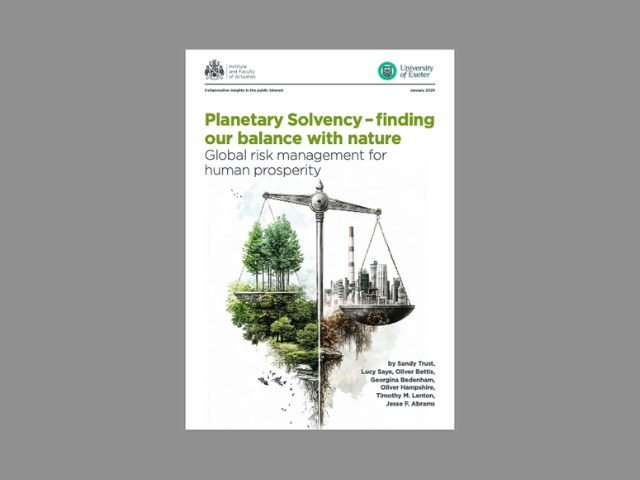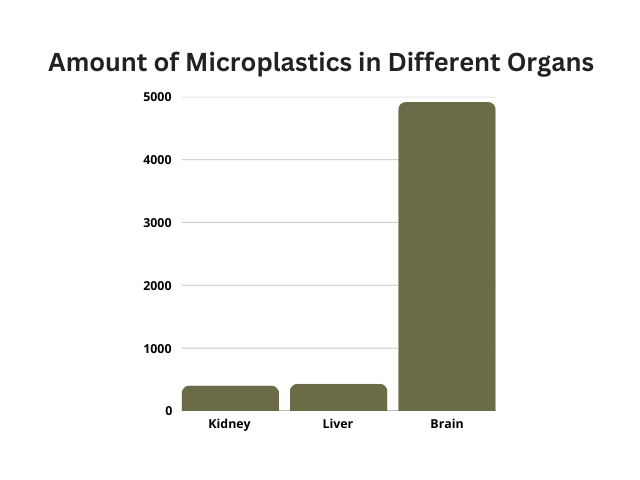
Cover of “Planetary solvency – finding our balance with nature: Global risk management for human prosperity” study.
The Big Picture
Imagine waking up to find grocery store shelves half-empty, the price of fresh produce soaring, and unpredictable storms disrupting everyday life. This isn’t science fiction—it’s a growing reality as our planet’s climate shifts in dangerous ways.
Scientists warn that unless we change course, we risk reaching Planetary Insolvency—a state where nature can no longer support human needs. But here’s the good news: we still have time to act. Understanding the risks and making smarter choices today can help us create a future where people and nature thrive together.
What Is Planetary Solvency?
Think about a business. If it spends more money than it earns, it eventually goes bankrupt. Our planet works in a similar way—if we take more from nature than it can regenerate, we risk collapsing the very systems that support life.
Planetary Solvency is the idea that we must manage Earth’s resources wisely to keep society stable. This means keeping our air and water clean, protecting forests and oceans, and ensuring that nature continues to provide the essentials we rely on—like food, water, and a livable climate.
For decades, economies have focused on short-term profit without considering the environmental “debt” we’re racking up. Now, we’re starting to see the consequences—but it’s not too late to course-correct.
The Warning Signs: Key Statistics You Need to Know
Climate scientists and risk analysts have uncovered troubling trends that show just how urgent this issue is:
- The past 12 months were the hottest on record, with global temperatures averaging 1.5°C above pre-industrial levels (Trust et al., 2025).
- A key ocean current system (AMOC) has a 45% chance of collapsing by 2040. This would cause extreme weather shifts, including stronger hurricanes, longer droughts, and disrupted food production.
- If global warming reaches 2.5°C, over 50% of land suitable for growing wheat and maize could be lost, making food shortages more common.
- Economic risk models ignore 87% of industries, assuming they won’t be affected by climate change. This is a dangerous miscalculation—nearly all businesses depend on stable natural systems.
- Some projections estimate that climate-driven disasters could reduce global GDP by up to 63% by 2100, leading to widespread economic instability.
The takeaway? Climate change isn’t just about rising temperatures—it affects food security, jobs, public health, and global stability.
Why Current Climate Plans Are Not Enough
Many governments have pledged to cut carbon emissions and protect ecosystems, but current efforts fall short. Here’s why:
- The Paris Agreement didn’t account for tipping points: Climate disasters don’t happen in isolation. When one event (like Arctic ice melting) triggers another (such as changing ocean currents), the effects spiral out of control. Many climate policies fail to consider this domino effect.
- Short-term economic focus: Many governments prioritize economic growth over environmental stability, even though our economy depends on nature—from agriculture to clean water to disaster resilience.
- Underestimated risks: Climate models often leave out the worst-case scenarios because they are hard to predict. However, ignoring unlikely but catastrophic events is a major risk management failure.
In short, we need stronger and more realistic climate policies that recognize the full scale of the threat.
What Needs to Change: The RESILIENCE Plan
To prevent Planetary Insolvency, experts recommend a RESILIENCE-based approach, which includes:
- Better Risk Assessments: Governments and businesses need realistic climate risk models—like financial audits, but for Earth’s health.
- Stronger Policies: Enforceable limits on pollution, deforestation, and overfishing.
- Faster Emissions Reductions: The longer we wait, the harder it becomes to prevent extreme warming.
- Restoring Nature: Protecting and rebuilding ecosystems like forests and wetlands, which absorb carbon and prevent natural disasters.
- Educating Leaders: Many policymakers lack a deep understanding of climate risk. We need climate-literate decision-makers who can balance economic growth with sustainability.
The path forward isn’t just about stopping damage—it’s about creating a world where nature and people thrive together.
What Can YOU Do?
While governments and businesses play a major role, individuals can make a difference too. Here are some ways to take action:
- Stay Informed: Read about climate solutions, not just problems. Understanding what works can help shape smarter decisions.
- Push for Policy Change: Vote for leaders and support policies that prioritize sustainability. Your voice matters.
- Make Smarter Choices: Support businesses committed to sustainable practices. Reduce waste and be mindful of energy consumption.
- Spread Awareness: Talk about these issues with friends and family. Many people want to help but don’t know where to start.
These small steps, when multiplied across millions of people, can drive real change.
Summing Up
The future isn’t set in stone. What we do today will determine whether our planet remains livable or spirals into crisis. By managing Earth’s resources as carefully as we manage money, we can protect future generations and ensure a stable, thriving world.The good news? We still have time to act—but the clock is ticking. Will we make the right choice?
Source: Trust, S., Saye, L., Bettis, O., Bedenham, G., Hampshire, O., Lenton, T. M., & Abrams, J. (2025, January). Planetary solvency – finding our balance with nature: Global risk management for human prosperity. Institute and Faculty of Actuaries & Exeter University.


